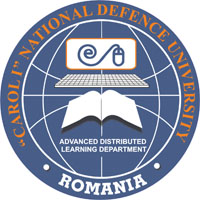FROM A TRADITIONAL LEARNING STYLE TO A HYBRID ONE: THE DOCTORAL PROGRAMS AT THE "CAROL I" NATIONAL DEFENSE UNIVERSITY
FROM A TRADITIONAL LEARNING STYLE TO A HYBRID ONE: THE DOCTORAL PROGRAMS AT THE "CAROL I" NATIONAL DEFENSE UNIVERSITY
Author(s): Valerică CruceruSubject(s): Education
Published by: Carol I National Defence University Publishing House
Keywords: doctoral programs; traditional/hybrid/blended learning; internet; scientific research; eLearning
Summary/Abstract: The eLearning programs have emerged as powerful tools that change the educational style on a global scale and the "Carol I" National Defense University of Romania has become a leading actor in this domain. This paper brings forward the results of a short case study with facts related to the current costs and benefits of the doctoral studies, followed by proposals about the implementation of a hybrid/blended learning program in the future. The doctoral programs organized by the university since 1968 have used mainly the traditional face to face approach, providing a rigorous, but limited learning experience. Since 2011 the internet has become an important tool used by Ph.D. coordinators and doctoral students to communicate, but that is an irregular pattern, just a piece in the puzzle of hybrid learning. The case study shows that doctoral programs developed around a traditional learning style are time and money consuming, offering a limited amount of sources for a valuable scientific research, so the doctoral students have limited opportunities. For a couple of years our university has access to national and international data bases, and the Distance Learning Department provides scientific materials and specific courses. It is obvious that we have some of the necessary tools, and is about time to design and implement doctoral programs based on a hybrid/blended learning style. We should develop programs where students can get classes, access course bibliography and conduct research online; the face to face interaction with Ph.D. coordinators has to give space for electronic interaction, using synchronous and asynchronous means. In fact we should take steps to develop and implement a doctoral program based on a type of learning that includes a combination of face-to-face classroom/tutorial sessions, live eLearning and self-paced research activities. We advocate the use of a hybrid learning style because it is ideally suited for doctoral programs, where students mainly need guidance, in order to develop knowledge. A hybrid learning style means continuity, opportunity and gives an active character to the scientific research. A hybrid learning style allows the doctoral school to function as a lively body, in full consonance with the evolution of a knowledge based society.
Journal: Conference proceedings of »eLearning and Software for Education« (eLSE)
- Issue Year: 11/2015
- Issue No: 01
- Page Range: 439-444
- Page Count: 6

